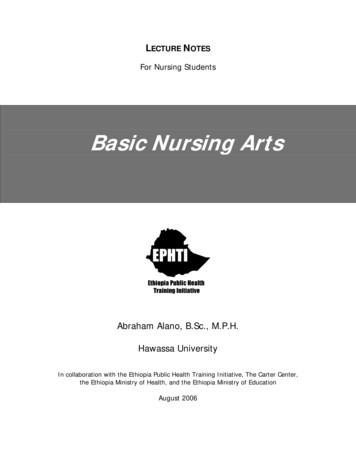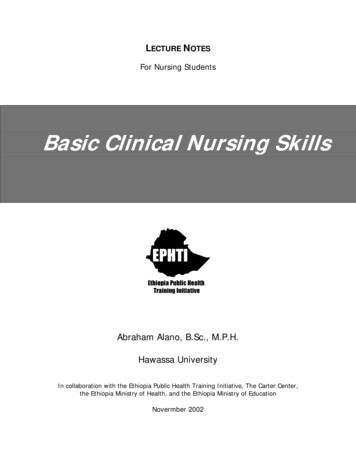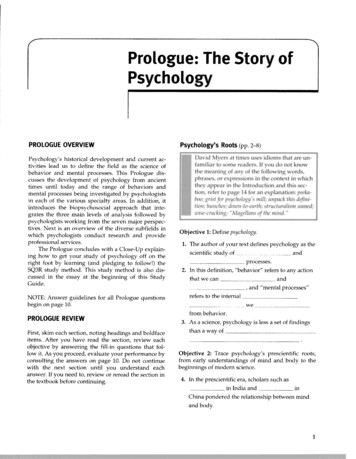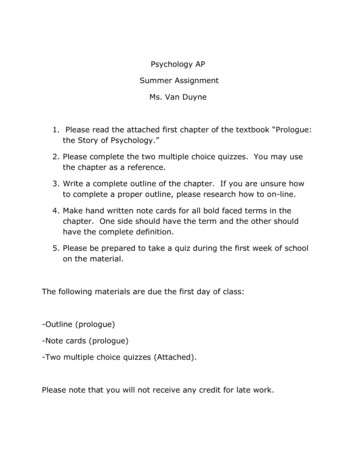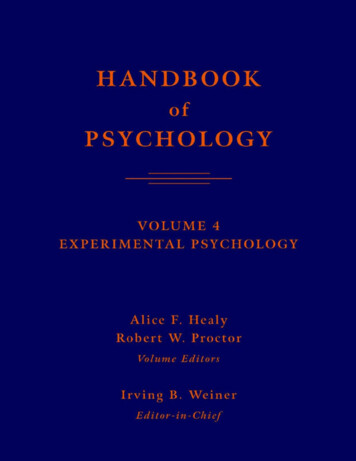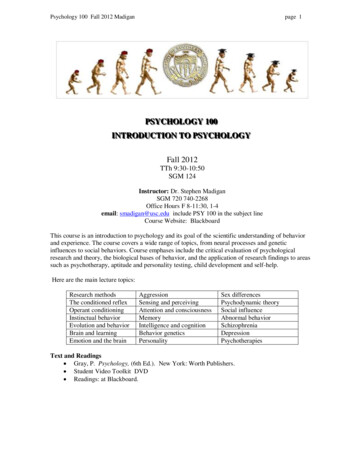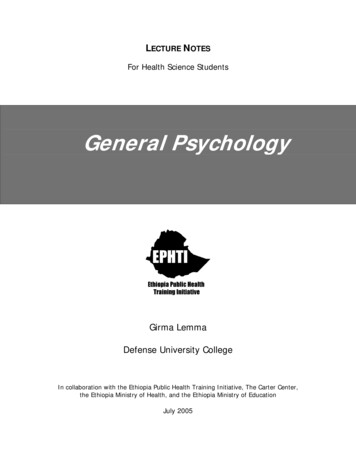
Transcription
LECTURE NOTESFor Health Science StudentsGeneral PsychologyGirma LemmaDefense University CollegeIn collaboration with the Ethiopia Public Health Training Initiative, The Carter Center,the Ethiopia Ministry of Health, and the Ethiopia Ministry of EducationJuly 2005
Funded under USAID Cooperative Agreement No. 663-A-00-00-0358-00.Produced in collaboration with the Ethiopia Public Health Training Initiative, The CarterCenter, the Ethiopia Ministry of Health, and the Ethiopia Ministry of Education.Important Guidelines for Printing and PhotocopyingLimited permission is granted free of charge to print or photocopy all pages of thispublication for educational, not-for-profit use by health care workers, students orfaculty. All copies must retain all author credits and copyright notices included in theoriginal document. Under no circumstances is it permissible to sell or distribute on acommercial basis, or to claim authorship of, copies of material reproduced from thispublication. 2006 by Girma LemmaAll rights reserved. Except as expressly provided above, no part of this publication maybe reproduced or transmitted in any form or by any means, electronic or mechanical,including photocopying, recording, or by any information storage and retrieval system,without written permission of the author or authors.This material is intended for educational use only by practicing health care workers orstudents and faculty in a health care field.
ACKNOWLEDGMENTSThe writer acknowledges with gratitude THE CARTERCENTER (TCC) ETHIOPIAN PUBLIC HEALTH TRAININGINITIATIVE (EPHTI) for initiating and providing financialsupport for the preparation of this lecture note. I would liketo extend my special thanks and appreciation to Dr.YouditAbraha and Dr. Bekele Kebede, dean and associate deanof the Defense College of Health Sciences, for theirfacilitation and constant monitoring of the work. Theinsightful comments forwarded by ato Waleligne fromAlemaya University, Ato Yohannes from Jimma University,Ato Yemataw Wondie from Gondar University, Ato FesehaW/ Michael and Ato Abesha Ayele from Kotobe College ofTeacher Education, Ato Fasika Melesse, Ato BirhaneG/Kidan and Ato mekonnen Zegeye from DefenseUniversity College deserve special attention.i
FOREWORDPsychology is increasingly getting importance in humanlives. Major problems of our time such as poverty,environmental and ecological crisis and many other socialand economic problems have important psychologicalimplications. Today, no walk of human life can be out of thepractical contributions of psychology. Its contribution isparticularly recognized in the area of health. Psychologistsfocus on the prevention of physical and psychologicalproblems rather than just on their treatment. To achievethis, the study of human behavior and how human beingsinteract with their environment and how they developphysically, socially, emotionally and mentally is important.This teaching material is prepared as part of The EthiopianPublic Health Initiative: Curriculum and Staff StrengtheningProgram sponsored by The Carter Center.It was recognized that there is a need to write simplifiedlecture notes to health science students enrolled in theuniversity colleges. The specific need for writing this lecturenote arose from mitigating shortages of teaching materialsin these higher institutions.This teaching material provides students with basicunderstanding of human behavior in general and shows theii
lems of our society in particular. It has incorporatedessential and selected topics arranged in a logical mannerso as to serve the prospective practitioners in carrying outtheir duties and responsibilities effectively.Each chapter begins with a list of behavioral objectives andan introductory remark about the contents, followed by briefconcepts structured in a didactic approach. The topicsunder each chapter are enriched with varieties of healthrelated examples and activities aimed at promoting activelearning. What is more, all chapters end with selfassessment questions measuring higher-order learningoutcomes in line with the objectives stated under eachchapter.Long years of teaching experience in the field coupled withconstructive comments and suggestions solicited from theintra and inter review workshops largely helped the writer toelaborate basic concepts of the subject in a simple andunderstandable way.Though the teaching material is intended primarily to serveinstructors and students in the health colleges, it is equallyrelevant to universities and colleges running non-healthrelated programs.iii
TABLE OF CONTENTSContent topicPageAcknowledgement . iForward . iiTable of contents . ivAcronyms . xChapter one: Introductory concepts in psychology .11.1. The subject matter of psychology.11.2. Major perspectives in the historicaldevelopment of Psychology .101.2.1. Early perspectives .111.2.2. Recent perspectives .191.3. Some branches of psychology .221.4. Research methods in psychology .28Chapter two: Biological basis of behavior .412.1. Definition and general remark .412.2. Neurons .422.3. Neurotransmitters .442.4. Major parts of the brain and their relationship tobehavior .48iv
2.5. Major components and functions of theendocrine system .54Chapter three: Sensations and perceptions.563.1. General remark .563.2. Basic terms and concepts related toSensation and perception .583.3. Theories related to sensation and perception.67Chapter four: Psychology of learning .774.1. General remark and definition .774.2. Modes of learning .794.3. Factors for effective learning .804.4. Theories of learning.834.4.1. General remark .834.4.2. Behaviorist learning theory .844.4.3. Cognitive learning theory .103Chapter five: Motivation and emotion .1175.1. Motivation: definition and general remark.1175.2. Theories of motivation .1185.3. Emotions.1255.3.1. Definition and general remark.1255.3.2. The functions of emotions.127v
5.3.3. Types of emotions .1285.3.4. Theories of emotion .1295.3.5. Expressions of emotions.132Chapter six: Developmental psychology .1346.1. Definitions and general remark.1346.2. Heredity versus environment issue.1376.3. Sensitive periods in development .1416.4. Stages of human development .1426.4.1. Pre-natal development.1426.4.2. Post-natal development .147Chapter seven: Psychology of personality.1677.1. Definition and general remark .1677.2. Historical development of personalitypsychology .1717.3. Theories of personality .1737.3.1. General remark.1747.3.2. Psychoanalytic theories.1777.3.2.1. Personality structures .1797.3.2.2. Anxiety and defense mechanism1847.3.2.3. Psycho-sexual stages and howpersonality develops .1897.3.3. Other psychoanalytic theories .1937.3.3.1. General remark.193vi
7.3.3.2. The analytic psychology of CarlJung .1947.3.3.3. Alfred Adlers individual psychology.1957.3.3.4. Evaluating psychoanalytic theories.1977.3.4. Trait theories.1987.3.4.1. General remark.1987.3.4.2. Allport’s trait approach .1997.3.4.3. Cattel’s personality traits.2017.3.4.4. Eysenack’s dimensions ofpersonality .2037.3.4.5. The new trend.2057.3.4.6. Evaluation of trait theories .2077.3.5. Humanistic approaches to personality.2077.4. Personality assessment.2097.4.1. General remark.2097.4.2. Self report inventories.2107.4.3. Projective techniques .2137.4.4. Physiological measures.2147.4.5. The interview technique.2157.4.6. Behavioral assessment .2167.4.7. Case study.2197.4.8. Personality and the health profession .220vii
Chapter eight: Health stress and coping .2228.1. Health .2228.1.1. What is health? .2228.1.2. Mental health .2268.1.3. Health models .2298.2. Definition of stress and stressors .2308.3. The coping process and coping strategies .2338.4. The general adaptive syndrome .2368.5. The role of psychology in health.238Chapter nine: Abnormal psychology .2419.1. General remark .2419.2. Mental health professionals.2439.3. Defining psychological disorders .2449.4. Perspectives on the causes of psychologicaldisorders .2489.4.1. The biological perspective .2489.4.2. The psychological perspective .2499.4.3. The interpersonal or family systemsperspective .2509.4.4. The socio cultural perspective.2509.5. Classification of psychological disorders .2519.5.1. Anxiety disorders.2519.5.2. Somatoform disorders.2559.5.3. Dissociate disorders .257viii
9.5.4. Mood disorder .2599.5.5. Schizophrenia .2619.5.6. Personality disorders .2649.5.7. Sexual and gender identity disorder .2699.5.8. Eating disorder.272Chapter ten: Treatment of psychological disorders .27410.1. General remark.27410.2. Treatment techniques.27510.2.1. Psychoanalytic therapy.27510.2.2. Behavioral therapy.27710.2.3. Cognitive approaches to therapy 28210.2.4. Humanistic therapy .285Glossary.288References .292ix
ACRONYMSWHO: world health organizationACH: acetylcholineDA: dopamineATP: adenosine tri-phosphateEEG: electro encephalogramCAT: computerized axial tomopgraphyHIV: human immuno-deficiency virusPET: position emission tomographyMRT: magnetic resonance imagingS-R: stimulus-responseUCS: unconditioned stimulusUCR: unconditioned responseNS: neutral stimulusCS: conditioned stimulusCR: conditioned responseVIS: visual information storeDRT: drive reduction theoryx
MMPI: Minnesota-multi phase inventoryABC: antecedent behavioral consequencesAIDS: acquired immuno deficiency syndromePTSD: post traumatic stress disorderGAs: general adaptive syndromeDSM: diagnostic statistical manualxi
General PsychologyCHAPTER ONEINTRODUCTORY CONCEPTS INPSYCHOLOGYObjectives: at the end of the chapter the student is expected to: Define basic terms in the course; Explain the role of psychology as a means of promotinghuman welfare; Differentiate the sub fields of psychology; Relate major perspective of psychology with issues it isconcerned about; Describe and evaluate major theoretical approaches topsychology; Identify the main areas of research interest andprofessional activities in psychology.1.1.The subject matter of psychology and its definitionBrainstorming: Students will exchange their experience on thefollowing questions as a means to assess their pre-conceptionabout the subject psychology.What comes to your mind when you hear the wordpsychology?
General PsychologyHave you read or listened to anything related topsychology?What was its content about?Did you appreciate it? Why?What do you expect from the course in psychology?The introductory part of psychology emphasizes on two aspects:1. Psychology as a scienceA Science is defined not by what it studies but by how it studies.Psychologists like any other scientists systematically observefacts about human beings and organize these facts to arrive atgeneralizations. Psychology shares with other sciences certainaims, assumptions, ways of carrying out research and ways ofbuilding and modifying theories.2. Psychology is a body of knowledge that can be applied to helpsolve a variety of human problems. In addition to the contributionin the area of research (developmental, social, experimental,physiological psychology), there are many other areas ofprofessional applications. Clinical psychologists work withpsychiatrists in a hospital context or with other healthprofessionals in the community. Educational psychologists workwith children and adolescents in schools, colleges, and nurseries2
General Psychologyand in the home. They collaborate with parents and teachers toassess a child’s progress at school and provide help and advice.Counseling psychologists work with individuals, families, couplesor groups to improve people’s well being, alleviate distress andhelp them solve their own problems and take their own decisions.Definition and general remarkThe word psychology is derived from two Greek words “psyche”and “logos.”Psyche means soul and logos means the study. Thus, originallypsychology was defined as the study of “soul” or “spirit.” But lateron philosophers defined psyche as mind. Because of this,psychology began to be regarded as the study of an individual’smind or mental process. Through time, this later definition ofpsychology was given up because the mind as an object doesnot exist: and cannot be observed and measured objectively. Themost widely and accepted definition of psychology is: thescience of behavior and mental processes of both humansand animals.There are some concepts in this definition which need furtherexplanations: The terms are “science” and “behavior.”3
General PsychologyWhat is science?Science is a group of related facts and principles of a particularsubject. In science we collect related facts by the use ofobjective methods to develop a theory to explain those facts.From a given set of conditions, science helps us to predict futurehappenings.Example-Biology explains how living things grow and develop.Anatomy describes the structure of human body. Physiologydeals with the function of various parts and systems of the body.Nursing and the rest of the health sciences are also founded onscience.Similarly, Psychology as a science deals systematically withhuman behavior, motives, feelings, emotions, thoughts andactions of men and women. Like other sciences, Psychologydiscovers and explains the underlying laws and principles ofbehavior. Its goals are describing, explaining, predicting andfinally modifying human behavior.What is behavior?Behavior In its broader sense includes all types of humanactivities.4
General PsychologyExample- Motor activities (Walking, speaking) Cognitive activities (perceiving, remembering, thinking,reasoning) Emotional activities (feeling happy, sad, angry, afraid)Behavior is both mental and bodily. Mental behaviors are thinking, reasoning, imaginationand other mental experiences or processes. Bodily behavior refers to the movements and actions ofthe body in response to a situation.Behavior is the reaction of an individual to a particularenvironment. The environment exerts influence on individuals.That influence is called stimulus. The stimulus in turn arousesan activity from the individual and this is called the response.Example-A man may be admitted to a hospital for a surgicaloperation (stimulus)The man feels frightened and worries because he is uncertainwhat may happen next (response)This stimulus response combination constitutes the behavior ofan individual.The human behavior consists of physical responses, ceiving, thinking, recalling, and reasoning.5responses,
General PsychologyBehavior shows growth and development from the early years ofinfancy to maturity and old age. Psychology as a science studieshow behavior grows and develops from infancy to old age andalso studies behavioral differences between people.In general there are four major facts proposed in relation to thenature of behavior. These are: Behavior has a bodily basis Behavior is dynamic Behavior varies from person to person Behavior is socialPsychologists collect facts of behavior by means of objectivemethods such as observation and experiment and predicthuman behavior.Example- a patient may react with anger if his movements arerestricted in the ward. If the health professional has knowledgeof scientific psychology, it is possible to predict and control thepatient’s behavior.At times psychologists study animal behavior. The reasons are: The study of animal behavior helps to develop generallaws of behavior that apply to all organisms. The study of animal behavior provides important clues toanswering questions about human behavior.6
General Psychology For ethical reasons it is sometimes difficult to conductpsychological experiments on human beings.Psychology has a contribution to thehealth professional.Some of the contributions are:1. It helps to understand oneself. Helps to make rational decisions onbecoming a health professional; To fulfill the need for economic selfsufficiency; Helps to assess ones own abilities andlimitations; Enables to control situations in the collegeand attain goal through self-discipline.2. It assists in understanding other people. The health professional works with tive staffs. Equipped with the knowledge of psychology,the health professional will achieve greatersuccess in interpersonal relationships. Psychology helps the health professional tolearn why others differ from him/her in their7
General Psychologypreferences, customs and beliefs or culturalpatterns.3. It enlightens to appreciate the necessity of changing theenvironment and how to bring it about. Bychangingtheenvironment,thehealthprofessional can bring about change in thepatient’s life.Example: introducing eyeglasses and hearing devices into theenvironment can help people with visual or auditoryimpairments.Scope-Psychology studies different subject matters and itsscope is diverse. It is related with other disciplines.1. Psychology and politicsMany political problems consist psychological problem. Thepolitical battle can be effectively carried on at all, in so far as itcan be supported by a scientific psychology.2. Psychology and EconomicsThe solution and clarification of an economic problem such aspoverty, for example, requires the full understanding of thepsychological needs of the human being: which is an essentialconcept in the theory of personality.8
General Psychology3. Psychology and HealthThe relationship is well articulated in so many health relatedbooks. It is also clearly stated in the WHO’s preamble asfollows:“Health is a state of complete physical, mental andsocial well-being, and not merely the absence ofdisease or infirmity.”The scope of psychology changed through time. Its expansionhas brought changes both in subject matter and methodology.Among the most important issues and questions that areaddressed by psychology at different historical periods are: Nature (heredity) versus Nurture (environment); Conscious versus unconscious determination ofbehavior; Observablebehaviorversusinternalmentalprocesses; Freedom of choice versus determination; Individual difference versus universal principles.Though there is a problem in clearly defining the scope andelaborating the methodology, psychology is attractive, importantand tantalizing.9
General illsandunderstanding that books and theory don'talways supply.b. Important -Human advancement is the activity of humanbrain. The human brain is the focus ofpsychological studies. It is the human brainthat has brought material security and culturalimprovement.c. Tantalizing - No branch of science is actually too easy tounderstand. Psychology is also the least‘easy’; because we are trying to study thebrain with the help of the brain. However, itstillcreatesthedesiretoknowandunderstand.1.2. Major perspectives in the historical development ofpsychologyPsychology broke away from philosophy and physiology andemerged as a separate discipline over 100 years ago. In the lastcentury, this young and fertile discipline went through a series ofchanges and expansions in both subject matter and researchmethods.10
General Psychology1.2.1. Early perspectives of psychology1.2.1.1. Structuralism Formal research in psychology began at the universityof Leipzig Germany where Wilhelm Wundt foundedthe first psychological laboratory in 1879. Wundt is considered as the first psychologist andfather of experimental psychology. He limited the subject matter of psychology to thestudy of conscious experience. The elements ofconscious experience were considered to be of twokinds. These are:Sensations: sights, sounds, tastes, smellsand touch, which arise from stimulation ofthe sense organs;Feelings: love, fear, joy, and so on He believed that all conscious experiences are merelyintricate combinations of elemental sensations i.e.sensory knowledge is the building block of ourintellect. Sensations combine to become consciousexperiences as basic elements are composed to formcomplex substances in chemistry. For example, anexperience such as meeting and recognizing an oldfriend in the street was thought to be composed ofmany independent sensations, feelings and images,11
General Psychologywhich were drawn together and synthesized by themind.Its method of study was introspection.In introspection people are taught, trained to observeandreportthe'content'or'elements' of awareness in a particularsituation.Forexample;peoplearepresented with stimulus such as a sentenceon a card and asked to describe in theirown words their own experiences.Introspection is detailed description and how people perceive things in the world.Comments:Introspection is not a true examination of thecontents of consciousness, but a retrospective glance at thatwhich has passed through consciousness. The problem is thatpeople will have difficulty in describing and explaining some kindsof inner experiences. Nowadays introspection as a method israrely used in some problem-solving andpsycholinguistic experiments. Otherwiseas an approach it is outdated.1.2.1.2. Functionalism TheAmericanpsychologistJames pioneered functionalism.12William
General Psychology It focused on what the mind does on thefunctions of mental activity and the role ofbehavior in allowing people to adapt totheir environment. Functionalism was strongly influenced bybiology. The work and ideas of CharlesDarwin had a great impact on theemergenceoffunctionalpsychology.According to Darwin’s theory of evolution,living organisms change and develop lwhosecharacteristics were best suited to theirenvironment survived and reproduced.While organisms whose characteristicswere less adaptable died out. Survivorswould transmit to the next generationthose characteristics that enabled them tosurvive. William James was greatly influenced byDarwin. James held that the function ofconsciousness was to enable humans tobehave in ways that would act survivalthrough adaptation to the environment.13
General PsychologyWhere these adaptive behaviors wererepeated frequently they became habits.Habits provide stability and predictabilityin society.1.2.1.3. Gestalt psychology The leading proponents of the Gestalt view were theGerman psychologists Max Wertheimer, Kurt Kafka andWolfgang Kohler. Instead of considering separate parts that make upthinking, Gestalt psychologists concentrated on the‘whole’. Their slogan is ‘the whole is greater than thesum of its parts’. Gestalt means shape, form orconfiguration. Their belief was that the whole is different from the sumof its parts. In order to understand our environment wehave to perceive it in its totality not in its individuality.Max werthiemer said that ‘it is a mistake to analyzepsychological events into pieces, or elements, asthe strtucturalists did.’ Further research by the Gestalt psychologists led to thedevelopment of a set of principles of perceptualorganization. Such organizations arose through thebrains innate ability to structure and organize the14
General Psychologyperceptual field into meaningful patterns rather thanperceiving the separate elements. For some of the mainGestalt principles of organization, see the chapter‘sensation and perception.’1.2.1.4. Psychoanalysis The Viennese neurologist and psychologistSigmund Freud (1856-1939) pioneered thepsychoanalytic perspective. Freud said that conscious experiences areonly the tip of the Iceberg. Beneath theconscious experience is Primitive biologicalurges that seek expression but which are inconflict with the norms and morality of thesociety. These unconscious motivations and conflictshave powerful influences on our consciousthoughts and actions. Therefore they areresponsible for much of human behaviorincluding physiological problems. Accordingto Freud, all behavior whether normal orabnormal is influenced by the ychic
General Psychology They cannot be directly studied throughintrospection.According to Freud the methods of studying theunconscious mind are:a. Free association In this method the psychoanalyst gives the client a wordand asks to reply with the first word that comes to mindbe it nonsense or irrelevant. The psychoanalyst makesassociations and meanings between ideas, words, andthought. It is a projective technique to explore the client’sunconscious thoughts.b. Dream analysis based on case studies The contents of dreams are analyzed for underlying orhidden motivations. Dreams are viewed as indication of what a person is trulyfeeling within the conscious mind. Freud said dreams us.’Remember the old proverb, which says. " Pigs dream about cornand geese dream about maize."16
General PsychologyComments: Most wishes are repressed in the human mind. Soit is difficult to understand and interpret the contents of dreams.Conclusion-The concept of unconscious experience stronglyinitiated psychological research in modern times.Freud’s work attracted many followers, but histheoryalsogeneratedmuchdebateandcontroversy. Even among his original followerssuch as Carl Jung and Alfred Adler, eventuallybroke away from him and developed their ownmodified thoughts of psychoanalytic theory. logy and Roger’s humanistic theory underpersonality psychology chapter seven.1.2.1.5. Behaviorism John Watson (1878-1958) revolutionized psychology bychanging the subject matter of psychology from thestudy of conscious experience to the study of behavior. Watson believed that the study of psychology should beabout observable behavior and its aim should be todescribe, predict, understand and control behavior. He contended that psychologists should never use theterms consciousness, mental states, introspection,imagery and the like.17
General Psychology Followers of behaviorism did not reject the existence ofmind and consciousness. Rather, they viewed theseconcepts as impossible to observe and contributing littleto a scientific approach to psychology. Watson’s focus on the study of observable behaviorenabled to formulate clear hypotheses, which could betested by experimentation. Watson’s view of learning relied to a great extent onPavlov’s account of classical conditioning. Accordingly, itis possible to break down and analyze a certain behaviorinto stimulus-response units. Much of the behaviorists’ research into learning wascarried out on animals, rather than humans; partlybecause animals were easy to obtain and greater controlcould be exercised over their environment, and partlybecause they accepted the idea that humans ally. The work of John Watson contributed much to the use ofmore objective and systematic methods to the study ofhuman behavior.18
General Psychology1.2.2. Recent perspectives1.2.2.1. The biological perspectiveIt states that behavior has a biological basis. Thebehavior
psychology; Identify the main areas of research interest and professional activities in psychology. 1.1.The subject matter of psychology and its definition Brainstorming: Students will exchange their experience on the following questions as a means to assess their pre-

